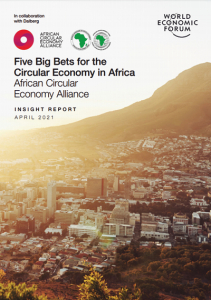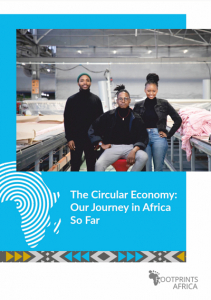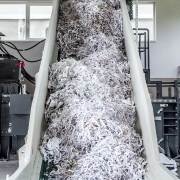Circular Economy – Five Big Bets on a Billion Dollar Opportunity for Africa
When in April this year, the World Economic Forum and the African Circular Economy Alliance had published the report on “Five Big Bets for the Circular Economy in Africa”, Al-Hamndou Dorsouma from African Development Bank, called this a “billion-dollar opportunity”.
Although Covid-19 had a negative impact on economies around the world, the crisis would present “a unique opportunity for many to rebuild green and potentially bounce back stronger than ever”, the Acting Director Climate Change & Green Growth of the multilateral development finance institution wrote on the World Economic Forum’s homepage. This chance was clear for the African continent when considering the circular economy. According to this report (www3.weforum.org/docs/WEF_Five_Big_Bets_for_the_Circular_Economy_in_Africa_2021.pdf), which also offers positive examples for African initiatives, increased circularity in several sectors would support the economy, jobs and the environment on the continent in the long term.
Therefore, Al-Hamndou Dorsouma’s first big bet refers to the waste conversion industry: In his view, circular methods could help prevent hunger while boosting the economy and protecting the
environment. “For instance, training farmers in methods such as recovering wastewater for irrigation can help shift production to more climate-smart models,” he stated in line with the WEF report. “Additionally, converting food waste to organic fertilizer can strengthen green manufacturing and increase circularity in food systems.” Rethinking agriculture could be key for the continent as the sector employs 60 percent of the Sub-Saharan workforce and comprises nearly a quarter of the continent’s gross domestic product (GDP).
In his next bet, the author addresses the plastic waste recycling industry. “Recycling has emerged as a solution to the growing demand for goods with plastic packaging, but it must be scaled to both mitigate the environmental effects and have significant impact,” he wrote. “To grapple with these trends, new circular-inspired incentives are needed.” That might come for consumers in the form of bottle deposit systems. Especially businesses could face corresponding legal provisions and tax incentives to boost investments in recycling facilities. “Such investments could present a significant opportunity: the global economy faces losses of up to 120 billion Dollar annually connected to plastic’s reduced value after first use”.
Al-Hamndou Dorsouma’s big bet number three applies to the mass timber industry. Due to the expected growth of African cities, greenhouse gas emissions in Africa are projected to increase by more than 2.5 times by 2050, driven by large transformations in urbanization, industrialization and electrification. “Abating these emissions is possible through the promotion of low-carbon infrastructure,” he is convinced. “Planet-centric designs using mass timber can reduce waste, conserve forests and manage emissions in African cities that are currently growing at twice the global average”.
An important issue is also e-waste management, which is nowadays a challenge for many African countries. “Attracting more investment for recycling e-waste will support green job creation and increased value capture”, underlined the Acting Director Climate Change & Green Growth of the African Development Bank in his next bet. “One key opportunity lies in developing the e-waste recycling industry and substantial collection facilities. That will require goods produced with longevity in mind, designed for recycling or repair. It will also include legislation that limits foreign e-waste. Such shifts could create new jobs and move many waste-pickers from the informal to the formal economy.”
Last but not least, a new textiles economy – based on circular economy principles – would lead to better outcomes, he pointed out. “One immediate opportunity for this sector includes converting fashion and textiles waste into garments for commercial export markets. But changes can also come to agriculture, using regenerative practices for the growing of crops such as cotton that renew the soil, and practices that lean away from ‘fast fashion’ to new business models based on ‘upcycling’ existing garments. These moves also could tackle waste on a range of levels as less than one percent of material used for garments is recycled (leading to a 100 billion Dollar annual loss).” Additionally, the fashion sector currently would use 342 million gallons of oil each year to produce plastic-based fibers.
“Foreign direct investment is key to Africa’s sustainable recovery”
According to Sosten Gwengwe, Minister of Trade in the Government of Malawi, and Ratnakar Adhikari, Executive Director of Enhanced Integrated Framework (EIF), diverse sectors in Africa have the potential to attract new investments and contribute to economic recovery after the pandemic. In light of the global economic downturn following Covid-19, foreign direct investments (FDI) have declined, they stated on the WEF homepage. The World Investment Report had informed that global FDI collapsed in 2020, falling by 35 percent. “This decline was concentrated in developed countries, where FDI flows fell by 58 percent. The decline in developing countries was relatively measured at -8 percent, thanks to robust flows to Asia. The distribution was uneven across regions, with Africa witnessing a reduction of 16 percent.”
However, the continuing and uncertain effects of the pandemic had clouded the outlook for FDI in Africa, they said. Greenfield announcements had fallen by 62 percent to 29 billion Dollar in 2020 from 77 billion Dollar in 2019, and international project finance for large infrastructure projects had declined by 74 percent to 32 billion Dollar. “These developments are concerning, as these types of investment are crucial for productive capacity and infrastructure development, which will be vital for a sustainable recovery,” Sosten Gwengwe and Ratnakar Adhikari wrote.
According to the African Economic Outlook, the economic growth of the continent shrank by 2.1 percent in 2020. It is expected to resume at a moderate pace of 3.4 percent in 2021. “This will be underpinned by a rebound in FDI and commodity prices, which has already seen an uptick, coupled with a resumption of tourism and a rollback of pandemic-induced restrictions and widespread rollout of Covid-19 vaccinations.”
FDI flows to Africa had evolved over the past decades as new sources of investment have opened up and emerging sectors have expanded. “A closer look at the opportunities this evolution presents should be a priority for African governments and investors looking to invest on the continent.”
They see an opportunity in financing sustainable development. Investment into the African continent over the coming years should ideally focus on the key sectors and opportunities that will define the continent’s growth in the short and long term, both authors are convinced. A few of these are:
- Renewable energy capacity in Africa could reach 310 GW (gigawatt) by 2030, which would put the continent at the forefront of renewable energy generation globally. There is significant scope for Africa to build a climate-resilient and low carbon continent with attractive investment opportunities on renewable energy.
- E-commerce and logistics: With the expected bolstering of economic activity on the continent through the implementation of the African Continental Free Trade Area (AfCFTA), progress in mobile and internet penetration is likely to stand at 50 percent in 2025, and growing consumer spending is expected to reach 2.1 trillion Dollar in 2025. Despite this, companies have largely failed to tap into Sub-Saharan Africa’s e-commerce potential, owing to infrastructure and logistical challenges, which represent an excellent opportunity for foreign investment.
- Sustainable tourism: In 2019, the tourism industry accounted for about seven percent of Africa’s GDP and contributed 169 billion Dollar to its economy. The International Monetary Fund predicted that real GDP among African countries dependent on tourism would shrink by 12 percent in 2020. However, here again, opportunities lie. A growing middle class and the launch of the AfCFTA could increase travel within and into the continent.
- Circular economy: The sharing, reusing, repairing, recycling and regenerating of materials to generate economic value and promote environmental sustainability offers tremendous potential for FDI in Africa. Of the five thematic areas identified by the African Circular Economy Alliance and the World Economic Forum, i.e. food systems, packaging, the built environment, electronics, and fashion and textiles, circular food systems alone can help create a trillion-dollar industry by 2030 while generating millions of inclusive green jobs.
The Covid-19 pandemic has created a unique opportunity to reframe investor engagement with the African continent, they emphasized. While improving the business climate for attracting FDI is important, building the capacity of investment promotion agencies on FDI promotion and facilitation would go a long way in helping the continent build back better, more so for the 33 least developed countries (LDCs) within the continent. To this end, the Enhanced Integrated Framework and the World Association for Investment Promotion Agencies have established a targeted program aimed at actively assisting investment promotion agencies from the LDCs (15 of which are in Africa).
(Published in GLOBAL RECYCLING Magazine 3/2021, Page 5, Photo: mariesacha / stock.adobe.com)










